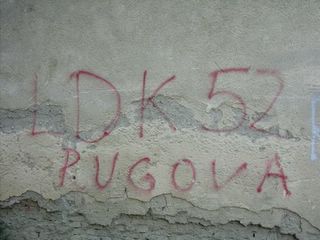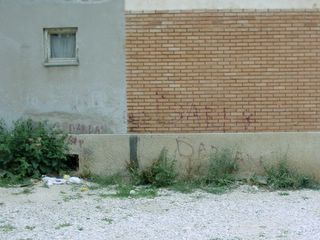I decided to officially archive this blog on the day my DPhil was confirmed. But I have waited for the electronic publication of my thesis, Interrogating Archaeological Ethics in Conflict Zones: Cultural Heritage Work in Cyprus, to announce the archiving. From now on, I will blog at Conflict Antiquities.
Saturday, August 27, 2011
Sunday, October 02, 2005

Decan political art 9:
[Corrected on the 14th of January 2007]
I had incorrectly asserted that:
"LDK 52 Rugova" refers to the 2004 local election results, in which Rugova and his party, the LDK (Lidhja Demokratike e Kosoves, the DLK - Democratic League of Kosovo - in English) won 52% of the Albanian vote.Kosovar has corrected my reading of the graffiti:
Graffitti LDK 52 doesn't speak of LDK election percentage, but of the LDK contestnt number in the ballot; LDK got 43%.

Decan political art 7: graffiti writings include "Dardania", the name of a kingdom within Illyria, the society that emerged in the Twelfth Century B.C.E. and that culture-historical archaeologies have characterised as the first Albanian community.
This may be the signature tag of a writer named Dardania, or a claim of an Albanian nationalist that this place, Kosova/Kosovo, is a part of Dardania/Albania, or both.
[Updated on the 14th of January 2007]
Vasilevs has commented that, 'Albanians are not Illirians.Ilirians were have a culture 1000. years ago.'
I don't know how clear my original phrasing was, as I talked about "culture-historical archaeologies", but I was only saying that archaeologists and historians who accept the idea of ancient ethnicity and of those ancient ethnic groups' continued existence into the present think that Dardanians/Illyrians were ancient Albanians.
Personally, I don't accept culture-historical narratives, but they're frequently the foundation of nationalist ideology, so they have to be addressed. As this graffiti made some reference to Dardania, I made some effort to explain it by noting its meaning as the name of the ancient kingdom and that ancient kingdom's use in culture-historical archaeologies.
I also included the possibility that it was tag of the artist, which could have been chosen as a reference to ancient Dardania, but could not have been; still, if an English tag artist chose "Saxon" as his moniker, I think it would be reasonable to think they might be making some reference to the ancient Saxon community.
[Updated on the 27th of January 2007]
Bytycci asked why I included Vasilevs' 'one-sided' comments as 'corrections' (although I had intended them to be a source of 'clarification', as they gave me the opportunity to explore some issues). I'll try to get round to something on this soon. I'm not saying Albanians aren't related to Illyrians, but I'm not saying they are - and I know that sounds like a cop-out.
From a culture-historical perspective, Illyrians were ancient Albanians (or Albanians are modern Illyrians), but from other approaches, tracing a direct line back through communities and cultures is seen as difficult or impossible, particularly when the public perception of communities and cultures is commonly as 'natural', 'eternal' groups that people cannot join or leave; moreover, the public frequently think that people cannot be members of more than one community or culture at the same time and that those groups in a sense have a life of their own and may even be worth dying for.
Vasilevs' comment in full read, '... Albanians are not Illirians.Ilirians were have a culture 1000. years ago,Albanians still living in primitive comunities.' I meant for them to be a source of 'clarification', rather than 'correction', as they allowed me to discuss culture-historical constructions of communities and histories. Also, it was only after I noticed a typo in his link and found the site he wanted to send people to that I realised exactly what he meant.
Naively, I originally thought he meant to say 'ancient' rather than 'primitive' and was trying to correct me that 'Albanians are not Illyrians', they were them 1,000 years ago, using 'primitive' to mean 'ancient' or 'technologically undeveloped', one thousand years ago.
It was only after I found the site he tried to link to that I realised he was a rabid Serb nationalist and was accusing them of being 'primitive' now.
Subscribe to:
Posts (Atom)









